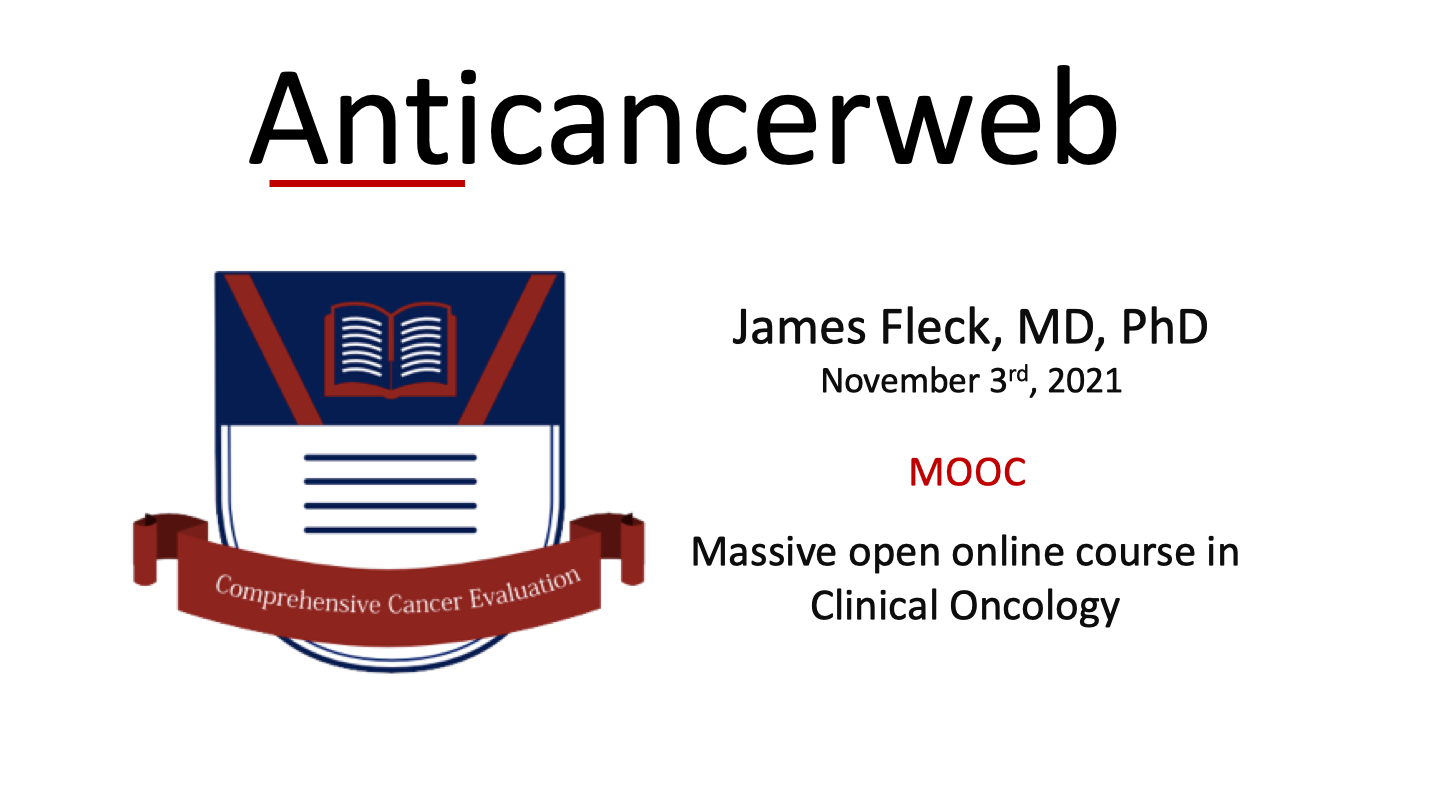
Molecular, clinical and social signature of Cancer
Learn more about the course
James Fleck, MD, PhD: Anticancerweb 03 (11), 2021
Anticancerweb is launching its first Massive Open Online Course (MOOC) in clinical oncology. It is an interactive course designed especially for undergraduate medical students. As oncology is an interdisciplinary specialty, interacting with almost all other clinical and surgical areas, the course will initially provide the student with the necessary integrative cognitive vision.It is a dynamic andragogical model, characterized by continuous updating, in which critical feedback from the group of students is progressively incorporated into the MOOC program. The identification of cognitive levels emerged from experiences shared between teachers and groups of students. In its first intervention, the teaching group identified the scope and suggested the creation of a priority scale. A color criterion was developed to help the student identify the skill level needed for each intervention (red = priority 1, blue = priority 2 and green = priority 3). The priority scale does not imply the relevance attributed to any of the themes. It is only used to guide students in optimizing their time for the sequential syllabus organization. Our suggestion is to follow the increasing numerical order of the color scale, favoring a supervised acquisition of knowledge and a gradual development of a critical view. Color coding is used to identify the MOOC module as well as the sessions that comprise it. As we will be working with new pedagogical resources, the first module describes the teaching methodology and familiarizes the student with its use. Although self-explanatory, all modules are interactive, providing programmed contact between the teacher and the group of students. In each module, assessments are used to provide ongoing feedback. The course was applied for several semesters to clinical medicine students at the School of Medicine of the Federal University of Rio Grande do Sul (UFRGS) and has already gone through several stages of improvement. The version offered is MOOC-Oncology-Version 8.0, which resulted from more than three thousand interactions between teachers and students. The interactions generated big data and new software was created, updating the content of successive versions of the MOOC, resulting in maximum relevance to the proposed subjects. We achieved a 98.5% satisfaction rate as a result of collective intelligence. We concluded for an optimized course of twenty hours distributed in four teaching modules. Module zero, lasting two hours, describes the teaching methodology consisting of clinical simulations, tumor workshops and collective intelligence exercises. Some of the comments on www.anticancerweb.com were made by MOOC students as an exercise in critical thinking. Module one, lasting four hours, explores the epidemiological signature of cancer around the world, describes risk factors, and explores strategic levels of interventions. Module 2, lasting six hours, addresses the early diagnosis of cancer in the most prevalent tumors and discusses the accuracy of the recommended methods. Module 3, lasting six hours, assesses the clinical and molecular expression of the most prevalent malignant tumors, highlighting the importance of personalized medicine. Module 4, lasting four hours, aims to develop structured reasoning, expressed in written language.
Meet the professor
How to participate in this collective intelligence program?
You can participate in this andragogical experience by expanding the database of a collective intelligence program. In return, you'll enjoy structured content on current principles that guide the molecular, clinical, and social signature of cancer. You will be trained to better understand, substantiate, integrate and translate knowledge in clinical oncology. Minimum eligibility criteria will apply. Contact the professor at oncologia.fleck@gmail.com expressing your interest in registering and participating. New classes scheduled to start in July / 2022

As a student of Professor James Fleck and using the method mentioned in the article as a way of learning, I say that this methodology is very interesting, giving the student the opportunity to be able to have autonomy regarding their study, but without ceasing to have the support and supervision of the teacher, which makes learning fully interactive and rewarding, especially since it is such an important medical specialty as is the case of oncology.
Sendo a Oncologia uma área fundamental na medicina, por abranger todas as especialidades e ser fundamental em cada uma delas, esse método foi de extrema importância, ainda mais valorizando a opinião dos alunos e tendo uma interação contínua com os professores. Dessa forma, não só é uma ferramenta de ensino adequada, principalmente na questão das cores, tornando ainda mais organizado, como também, uma forma de aprendizado com evolução contínua por ser construída interativamente e de maneira conjunta entre discente e docente.
This method/plataform is a very interesting way to teach clinical oncology skills addressed to undergraduated medical students. As a student of his, and user of this platform, I can guarantee its validity in teaching, and in the current pandemic, this plataform becomes more relavant than ever before, taking in advance the fact of the lack of presential classes. Here in Brazil we, medical students, are exposed to direct contact with patients very soon in our undergraduation, and understand soft skills to deal with different cases and patients is very important to stablish a good transference in the physian/patient relation.
Please login to write your comment.
If you do not have an account at Anticancerweb Portal, register now.